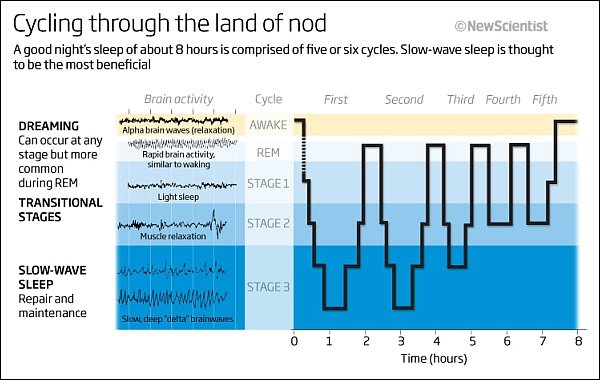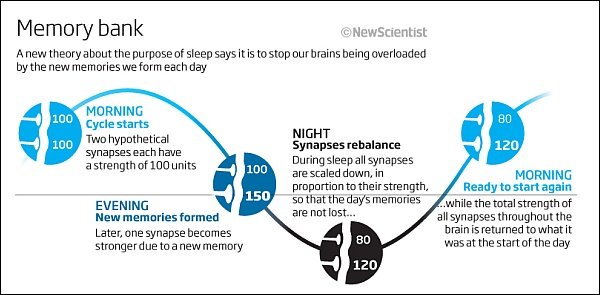In the dream, we spend about a third of his life. If we deny this, we get sick. But we still do not know well why you should sleep.
At first glance, the answer is obvious: to the brain and other organs could rest and recover. But why can not we have a rest, staying awake and continued to be on guard? Why can not we regain strength, be sober?

Sleep - as a widespread phenomenon in nature that it must be insanely useful. Even fruit flies and nematodes, at times fall into a state of complete inactivity, walked out not very easy, it is a dream properties even protozoan. But long-term observations and have not given the correlation between sleep and physiological needs of animals. So another secret is the variety of types of sleep.
For example, some bats are sleeping 20 hours a day, and large herbivorous mammals - less than four. Horses and did enough to take a nap while standing for a few minutes per day that add up to about three hours. Some newborn dolphins and whales awake with their mothers throughout the first month.
In short, to find a single, universal sleep function and failed. "The physiological changes during sleep vary widely in different species - said Marcos Frank of the University of Pennsylvania (USA). - But they all sleep affects the functioning of the brain. " Therefore, most researchers have focused on that body. The most obvious symptom of sleep is recognized, relatively speaking, the loss of "consciousness" (or abbreviated as "consciousness" of some animals). And lack of sleep leads to cognitive crisis not only in humans but also in rats, fruit flies, and almost all the other species studied.
The main part is occupied by slow-wave sleep phase, known as the third stage, or stage of deep sleep (see. Chart). Its peculiar characteristic brain wave electrical activity caused by the synchronized activation of neurons that occurs about once per second. With her blend other stages - rapid eye movement phase, when brain activity resembles wakefulness, and the transitions between them.

A hundred years ago it was thought that the period of wakefulness in us produces a toxin accumulation that we finally can not resist and go to sleep, to allow to purify the brain. Such a substance was not detected, and a modern version of the same hypothesis states: day gradual decrease of supply of large molecules needed for brain function, including proteins, RNA, and cholesterol. Stocks are replenished just in time for sleep. In animal experiments it was found out that the production of such molecules increases during slow-wave sleep. However, according to the skeptics, this is only a correlation, and we can not say that our desire for sleep depends on the level of these molecules.
The second group also has a long history. More Sigmund Freud suggested that dreams are devoted to the execution of all cherished desires (often disguised), but in science, this hypothesis was not confirmed. However, there is good reason to believe that during sleep, the brain still carries a very important and unique feature: it is engaged in the consolidation of memory. Memories are not carved in stone at the time of the event. At first, they are kept in a kind of memory, and only after that for some reason it seemed important, is sent to the ROM.
Experiments on animals and humans indicate that the strongest memories are formed when memorizing and remembering moments shared dream. For example, during one of the experiments the electrodes placed in the rat brains showed that during sleep a small group of neurons reproduce the operation mode, which was first recorded when the rats were awake and learn.
It is gaining momentum a new hypothesis, unifying the two explanations since 2003. In the center of her attention - the synapses, through which neurons communicate. It is known that in the formation of memories of synapses participating in the process of neurons becoming stronger. The basic idea is that in the waking state, we constantly create new memories and thus strengthen synapses. But this process can not continue indefinitely: at some point would have been achieved maximum energy efficiency and new memories cease to be formed. The solution becomes a phase of slow wave sleep: in the absence of an incoming data stream slowly "firing" neurons gradually reduce the strength of synapses in all directions, while maintaining the relative difference in strength between the synapses and allowing new memories remain (see chart below.)

"The hypothesis of synaptic homeostasis" received a lot of evidence. Scanning the human brain suggests that our gray matter requires more energy at the end of the day than at the beginning. Giulio Tononi and Chiara Cirelli of Viskonskin State University in Madison (USA), a hypothesis that has shown that in rodents and fruit flies synapse strength increases during the waking period and decreases during sleep. Moreover, when we study what the work requires a certain part of the brain, it is this area generates more intense slow waves during subsequent sleep.
Although a lot of attention, which in recent years has received this hypothesis, it has not yet managed to win the hearts of one and all. For example, neuroscientist Jerry Siegel of the University of California in Los Angeles (USA), is of the opinion that the dream - it is simply an adaptive way to save energy without doing feeding and breeding. The animal finds a secluded place, hiding in it and protects himself for the future. A difference in the way of sleep among species - a consequence of differences in lifestyle.
But most still are inclined to think that the function of sleep is as complex as it is complex brain. Probably, concise answer to the question of why we sleep, barely able to get.
I upvoted You